Grow your business with the Discover newsletter
Logistics advice & insights straight to your inbox
Subscribe now
The trading bridge between South Korea and Sri Lanka has strengthened over the years, with US$327 million worth of imported products from South Korea entering the Sri Lankan market. As businesses in both nations aim to leverage this flourishing relationship, understanding how to import goods, particularly products like South Korean skin care products, clothes, and cosmetics, becomes crucial. This blog guides businesses through the essentials of exporting from South Korea and importing into Sri Lanka, aligning with DHL Express’ international shipping expertise.
When planning to import from South Korea, it's essential to understand the various customs duties, taxes, and other fees that come into play. These costs can significantly impact the final price of the imported goods, including popular items like South Korean export products and cosmetics.
Utilising free trade agreements (FTAs), such as the Asia Pacific Trade Agreement (APTA), a critical free trade agreement involving South Korea and Sri Lanka, is crucial in reducing trade barriers. It facilitates economic integration by lowering or eliminating tariffs on various goods. APTA offers significant benefits like reduced tariffs for electronics, machinery, textiles, apparel, and certain agricultural products. This reduction in tariffs under APTA makes importing these goods from South Korea to Sri Lanka more cost-effective, enhancing trade opportunities and enabling competitive pricing. Understanding and leveraging APTA's benefits, especially with guidance from logistics experts like DHL Express, is vital for efficient international trade.
When importing from South Korea to Sri Lanka, understanding the list of restricted and prohibited items is crucial. These are items that, due to various reasons such as health, security, or environmental concerns, are not allowed or require special permissions to be imported. Here is the list of items that Sri Lanka controls from entering its borders:
List of prohibited items:
List of restricted items:
List of items under licence control:
Businesses must stay informed about these regulations to avoid legal issues and potential delays in customs when shipping from South Korea to Sri Lanka. It's essential to consult with customs clearance authorities or work with experienced logistics providers like DHL Express, who can offer guidance on navigating these complexities in international trade.

Ensuring accurate and complete documentation is crucial for smooth customs clearance when importing goods from South Korea to Sri Lanka. Provide complete and correct paperwork to avoid delays, additional costs, or even the seizure of the goods. Here are vital documents that businesses must prepare:
Having these documents in order and ensuring they align with both South Korean export and Sri Lanka import regulations is vital for a hassle-free import process. Working with experienced logistics providers like DHL Express can provide invaluable assistance in managing this aspect of overseas shipping.
When importing goods from South Korea to Sri Lanka, proper packaging and labelling are vital for the items' safety during transit and for ensuring compliance with Sri Lankan regulations. This compliance is essential for a smooth customs clearance procedure and to avoid delays or penalties.
Packaging standards:
Labelling requirements:
Additional considerations:
Partnering with DHL Express can significantly simplify the complexities of importing from South Korea to Sri Lanka. With their profound expertise in international shipping and customs regulations, DHL Express is adept at navigating the intricacies of customs duties, taxes, and import procedures specific to these countries. We provide reliable and timely shipments, ensuring that goods are delivered efficiently and on schedule. The company's advanced tracking systems offer businesses transparency and security, allowing them to monitor their shipments closely.
DHL Express caters to a wide range of shipping needs with customised logistics solutions, whether for fragile items, perishables, or large-scale industrial equipment. This flexibility makes them a suitable partner for businesses of all sizes, including small and medium-sized enterprises. Businesses can ensure a hassle-free import process by choosing DHL Express, bridging the trade gap between South Korea and Sri Lanka with ease and professionalism.
Discover how DHL Express Sri Lanka can help your business today.